概述
在快速发展的储能领域, 之间的竞争 锂硫电池 (锂硫) 和锂离子 (锂离子) 电池受到高度关注, 推动下一代解决方案的探索. 本文旨在通过展示它们的基本化学来揭示两者的潜力, 性能特点, 和实际应用.
通过深入研究锂硫电池与锂离子电池的竞争格局, 我们的目的是强调这些技术可能对重塑储能行业产生的潜在影响.
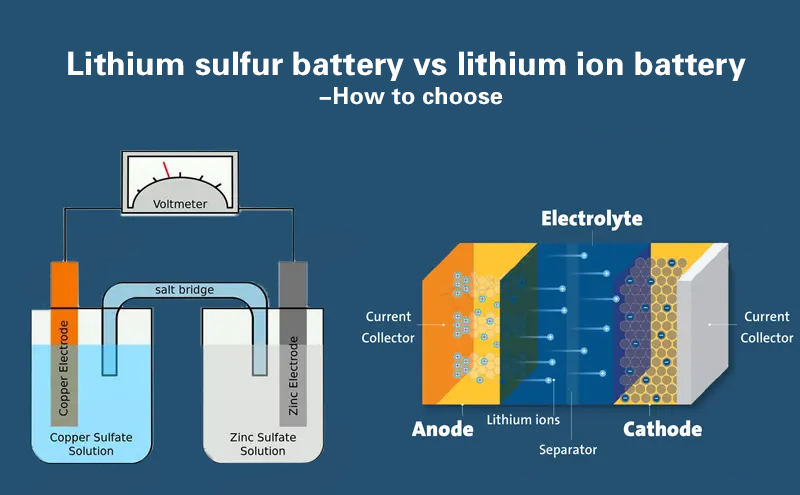
例如, 电动汽车 (电动车) 行业即将发生重大变革, 且锂硫电池处于领先地位.
这些创新的电化学电池有望通过提供优于传统锂离子电池的独特优势,重新定义储能市场的未来. 在本文中, 我们来探讨一下锂硫电池相对于锂离子电池的主要优势, 以及这些进步如何引导我们走向更清洁、更可持续的使用.
什么是锂硫电池?
硫磺价格低廉且储量丰富, 并且在地球上大量存在. 特别是在石油和天然气的提炼过程中, 大量的黄色硫元素经常在化石燃料工厂外积聚.
对于研究化学反应如何发电的科学家来说, 硫一直被认为是一种非常有吸引力的储能材料. 这是因为锂和硫的结合有潜力创造出一种优秀的电池,不仅可以存储更多的能量, 但在某些场景下也比目前使用的锂离子电池更具成本效益.
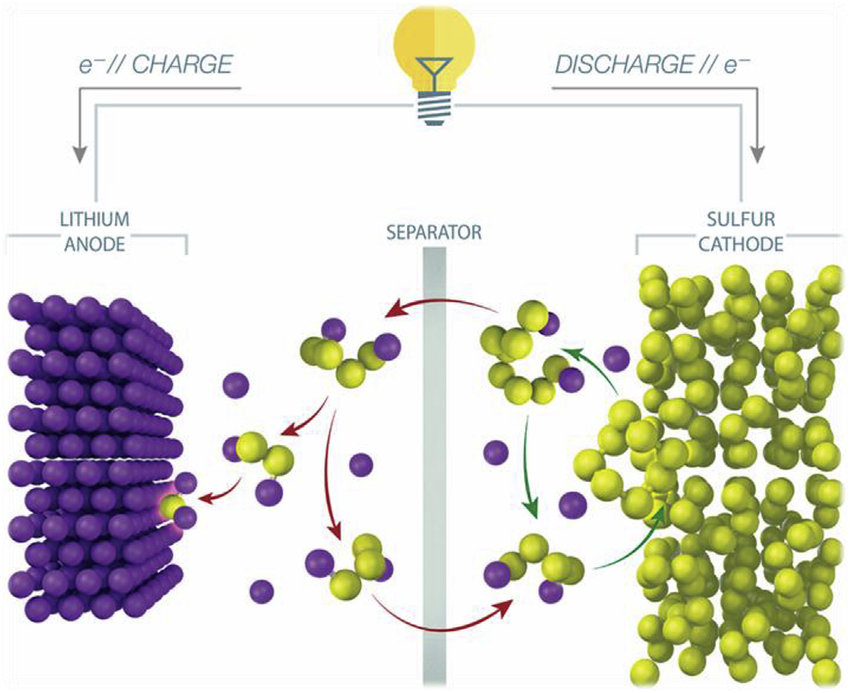
锂硫电池是一种以锂为阳极、硫为阴极的可充电电池. 与其他电池相比, 锂硫电池以其高能量密度和低成本潜力而闻名. 放电过程中, 阳极中的锂离子与阴极中的硫反应生成硫化锂并释放电子. 充电时, 这个过程将被逆转, 允许电池重复充电和使用.
什么是锂离子电池?
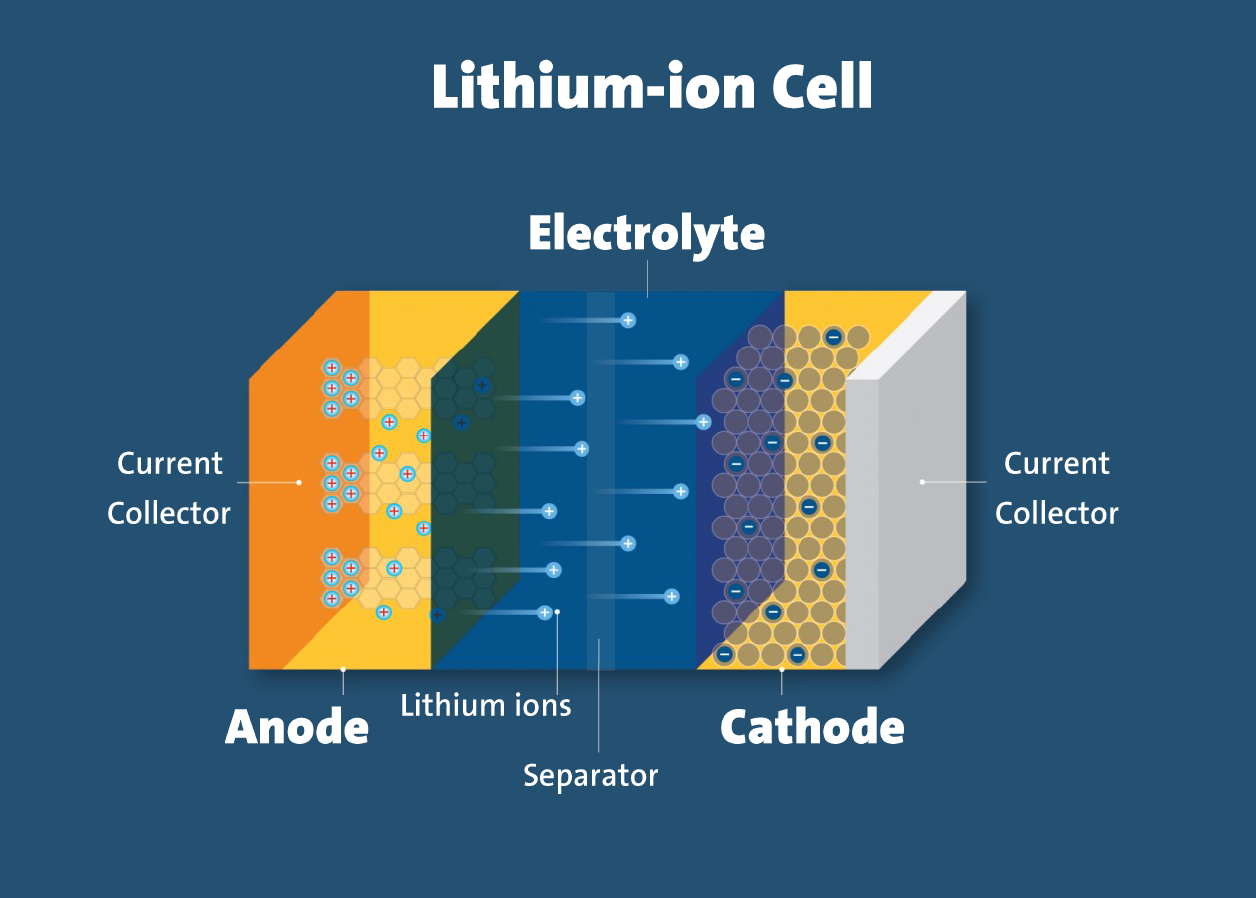
锂离子电池也是常见的充电电池类型.
它通过锂离子在阳极和阴极之间的移动来存储和释放能量. 放电过程中, 锂离子从石墨阳极通过电解质移动到通常由钴组成的金属氧化物阴极, 镍, 或锰, 产生电流. 并且在充电过程中, 这个过程将被逆转.
锂离子电池根据电解质形式分为固态锂离子电池和液态锂离子电池. 而且其锂离子化学成分不同, 并且电池分为很多种.
有关类别的详细信息, 请参考这篇文章: 6 可供选择的锂离子电池的化学类型.
锂离子电池因其能量密度高等优异的自身特性而广受欢迎, 循环寿命长, 并且重量相对较轻. 它们已成为电动汽车的首选 (电动车) 电池是现代科技装备和运输车辆的重要动力源.
锂硫电池与锂离子电池——有什么区别
比较锂硫电池和 锂离子电池, 不同方面会有一定的差异. 以下比较是综合考虑技术发展现状和正在进行的研究成果.
锂硫电池有哪些优点?
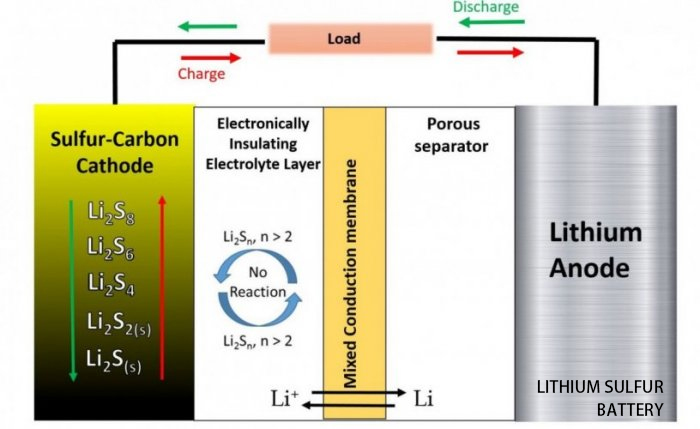
更高的能量密度 : 锂硫电池的能量密度明显高于锂离子电池, 达到500Wh/kg, 约为传统锂离子电池的五倍.
更经济 : 正如前面提到的, 地球拥有丰富的硫磺储量, 这使得硫磺原料的价格非常低. 所以, 从长远来看, 锂硫电池具有更高的性价比潜力.
环境效益 : 硫磺是一种无毒物质, 而且锂硫电池比电解液中可能使用重金属的锂电池更环保.
锂硫电池有哪些缺点?
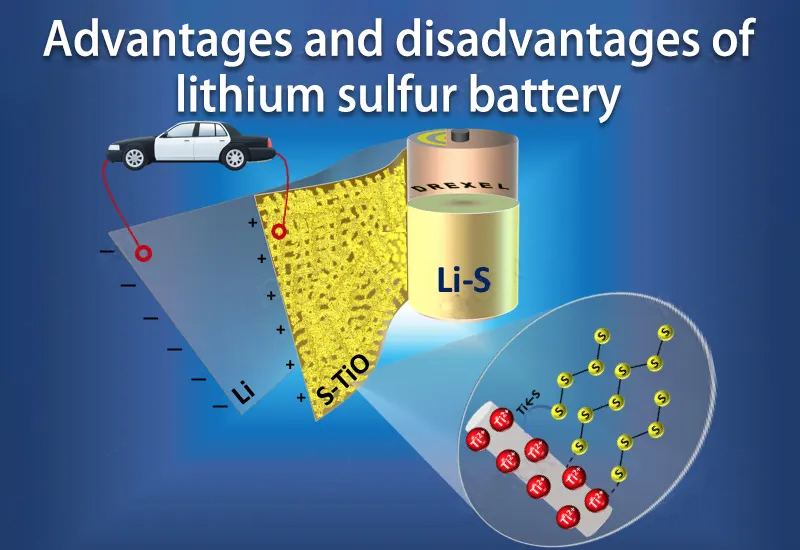
更少的循环次数 : 多硫化物会溶解在电解液中, 导致锂硫电池容量逐渐下降, 导致相对较短的循环寿命.
导电性差 : 硫及其放电产物的导电性较差, 所以需要添加导电助剂来提高导电率. 这将占用一些设计空间, 从而降低电池的整体能量密度.
体积膨胀 : 在充电和放电循环过程中, 锂硫电池体积将发生显着变化, 最多可达 80%. 这种显着的体积变化可能会导致电池机械性能下降, 从而影响其稳定性和寿命.
锂离子电池有哪些优点?
使用寿命更长 : 锂离子电池通常具有较长的循环寿命,在其性能显着下降之前可以经历数千次充电放电循环. 锂离子电池在长期使用中表现出更高的稳定性和可靠性.
效率更高 : 锂离子电池的库仑效率非常高, 甚至达到 99%, 这意味着在充电和放电过程中能量损失非常小. 高库仑效率保证锂离子电池在使用过程中能量转换更加高效.
电压稳定 : 锂离子电池可提供稳定的放电电压, 这对于电子设备的正常运行至关重要.
稳定的电压输出可以保证设备在使用过程中性能的一致性, 避免因电压波动造成功能异常或损坏.
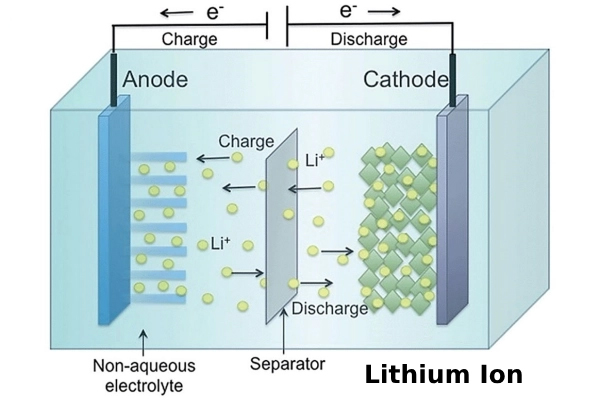
锂离子电池有哪些缺点?
成本高 : 锂离子电池相对昂贵,主要是因为它们使用了昂贵的材料,例如钴. 然而, 当前的锂离子电池受到镍供应有限的阻碍.
钴是当今锂离子电池的另一个关键成分, 主要产于刚果民主共和国, 钴矿受到人权问题困扰的地方. 有人呼吁停止此类采矿.
安全风险 : 如果电池损坏或充电不当, 由于电解液的易燃性,可能会增加火灾风险. 锂离子电池的安全风险远高于铅酸电池, 尤其是在高温天气下.
环境影响 : 锂和钴在提取和加工过程中都会对环境和道德产生影响. 首先, 它们可能在采矿过程中对生态系统造成破坏, 其次, 加工过程中可能会释放有害化学物质.
此外, 所涉及的劳动条件可能不符合国际劳工标准, 造成重大道德问题.
锂硫电池和锂离子电池 - 全面比较

锂硫电池的理论能量密度 (500瓦时/公斤) 高于锂离子电池 (150-250瓦时/公斤), 这使得它们在需要高能量存储的应用中更加强大.
硫的丰富性和低成本可以使锂硫电池比目前的锂离子电池组便宜得多, 并减少对有问题领域的依赖, 所以锂硫电池通常更便宜. 相比之下, 锂离子电池更贵.
锂离子电池的使用寿命比较长, 通常超过 1000 周期. 重复充放电循环过程中多硫化锂的溶解和硫正极的降解导致容量下降, 导致锂硫电池寿命缩短.
锂离子电池电解液易燃,可能造成危险. 硫磺不易燃,毒性低. 技术处理后, 它仍然可以产生无毒的硫磺. 锂硫电池普遍被认为更安全、更环保.
与锂离子电池相比, 锂硫电池自放电率较低, 这意味着它们可以更长时间地保留储存的能量. 相比之下, 锂离子电池具有更长的循环寿命和更高的实际能量密度.
与锂离子电池相比, 锂硫电池技术仍处于早期发展阶段. 克服与硫阴极稳定性相关的技术挑战, 电解质相容性, 整体性能对于广泛的应用至关重要.
虽然仍处于研发阶段, 锂硫电池在需要更高能量密度的应用中显示出潜力, 例如电动汽车和电网规模的储能, 具有重量轻、性价比高等优点.
锂硫电池和锂离子电池如何做出最佳选择?
锂硫电池和锂离子电池之间的选择取决于您应用的具体需求和限制.
例如, 在申请要求中, 考虑到产品的高能量密度: 锂硫电池可能更适合电动汽车或航空航天等应用, 因为高能量密度至关重要.
如果您需要持久耐用的电池, 例如消费电子产品或网格存储, 那么锂离子电池是更好的选择,因为它们具有更长的循环寿命.
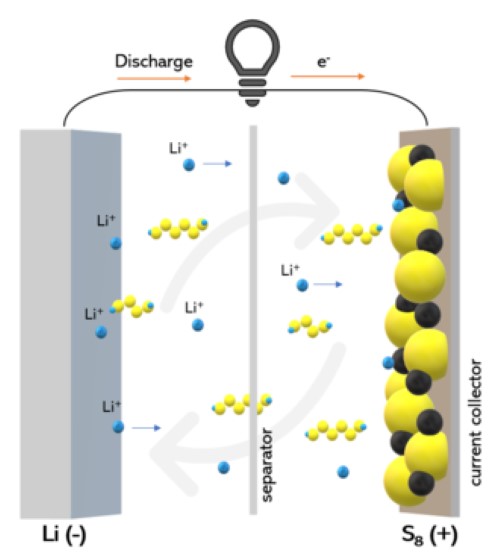
如果成本是首要考虑因素, 然后与锂离子电池中使用的金属进行比较, 硫磺成本较低, 所以锂硫电池可能对你更有吸引力. 同时, 总拥有成本, 包括更换电池的费用, 还需要考虑.
如果优先考虑减少生态影响和安全: 适用于医疗设备或便携式电子设备等安全关键应用, 硫的不燃特性在锂硫电池中具有优势.
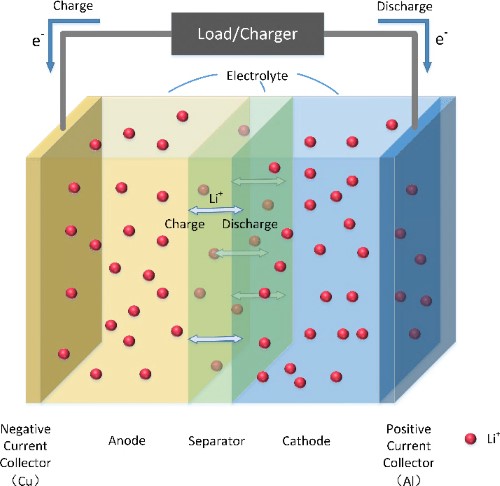
此外, 锂离子电池通常提供更稳定的电压和更高的效率, 使它们更适合需要稳定功率输出的应用. 适用于高负载要求的应用, 例如电动工具或电动汽车, 锂离子电池的稳健性和效率具有显着优势.
结论
总之, 锂硫 (锂硫) 由于其优异的能量密度,为传统锂离子电池替代品提供了极具吸引力的电池产品, 轻量化效率, 降低成本, 和快速充电能力. 例如, 在电动汽车等电池市场, 本身的电池也有一定的优势, 有望彻底改变电动汽车领域.
LISB的前景在于其令人印象深刻的能量密度和硫 - 与目前在Libs中使用的金属相比. 随着该领域研发的不断进步, 锂硫电池正在向前发展.
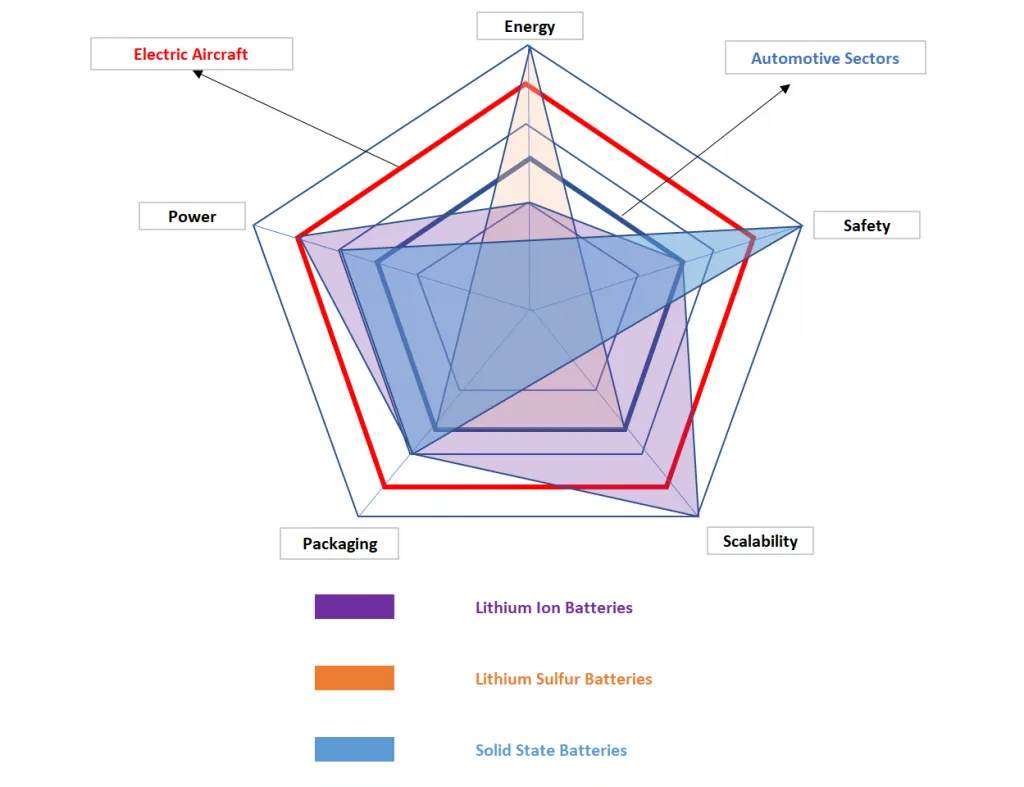
电池技术的进步越来越看好锂硫电池作为高性能储能系统的潜力. 成为锂离子电池市场潜在的有力竞争者. 尽管锂硫电池的一些重大问题是显而易见的, 解决这些问题取得了新的技术成果, 例如 纳米多孔 膜和创新的电极结构. 随着当今社会的电气化, LiSB发展路径清晰: 开展研究, 克服技术障碍, 扩大生产规模,进入大众市场. 可以说,锂硫电池前景广阔.
经常问的问题
锂硫电池能用多久?
锂硫电池通常可以经历大约 300-500 充放电循环, 之后容量将显着下降. 因此其寿命通常比锂离子电池短 (锂离子) 电池. 这主要是由于多硫化物的溶解以及由此导致的活性物质的损失. 现在, 主要研究方向也是如何提高锂硫电池的使用寿命.
锂硫电池可燃吗?
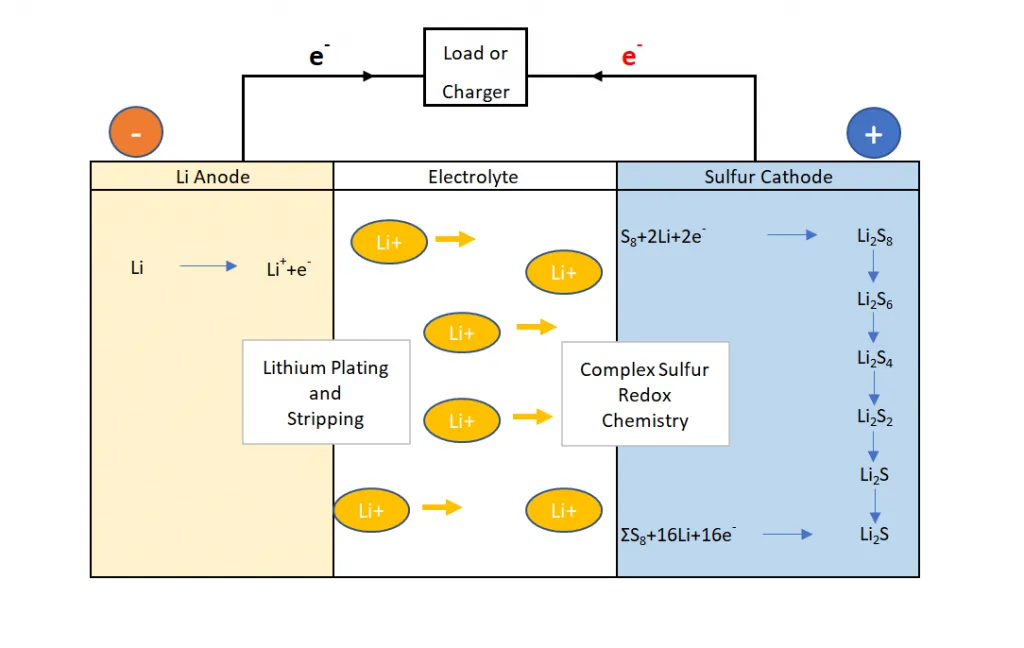
锂硫电池通常被认为比锂离子电池更安全且不易燃. 这是因为硫不易燃,并且比锂离子电池中使用的金属氧化物具有较低的反应性.
然而, 锂硫电池结构中使用的电解液等材料仍影响其安全性. 这也可以这么理解. 产生化学反应, 需要一定的条件, 反应产生能量. 只要合理使用, 风险是可以规避的.
锂硫电池能否商业化?
当然, 但目前锂硫电池尚未大规模商业化应用.
尽管锂硫电池因其高能量密度和成本优势而前景广阔, 他们仍处于研发阶段. 一些公司已经开始开发商业产品, 但正式进入市场还需要一段时间.
固态锂硫是锂离子电池吗? 他们有什么特点?
固态锂 硫电池使用固体电解质代替锂离子电池中常见的液体电解质.
可以认为固态锂硫电池是锂离子电池的一种, 虽然固态锂硫电池与传统锂离子电池不一样. 但在锂电池范畴, 它们在充电电池技术上有相似之处.
锂硫电池会成为超越锂离子电池甚至更好的下一代电池吗?
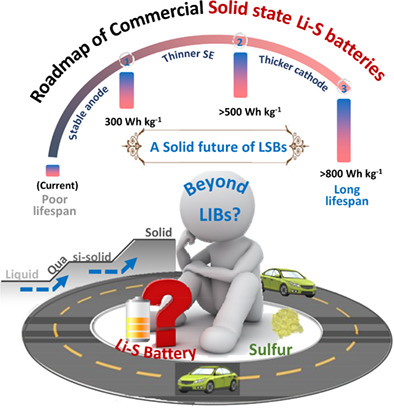
研究的主要瓶颈之一是循环不良 锂硫电池. 目前的解决办法是采用针对材料的方法, 电极/电解质, 电池集成水平将LSB从领导者转变为真正的领导者,以追求“超越自由”. 市场认为,在LSB未来十年的商业化预期中, “液体趋势”将逐渐被“固态未来”取代. 这也可以解决电解液中多硫化物溶解导致的容量下降问题, 这会影响锂硫电池的使用寿命.
